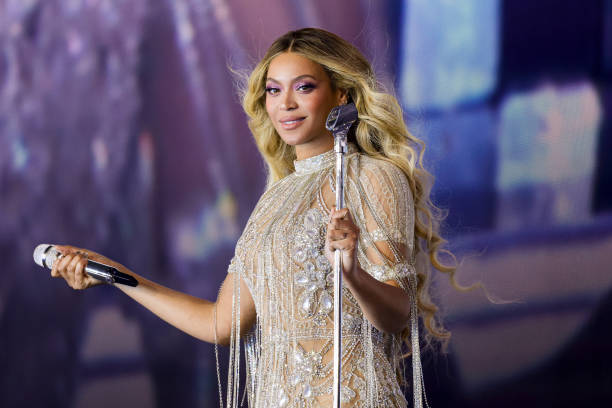Beyoncé announced she will be boycotting performances in red states following the re-election of Donald Trump. Known for her commitment to social justice and equality, the pop icon shared a statement on Instagram, saying, “I can’t in good conscience perform in states that support leaders who don’t stand for equality and unity. I love my fans, but I have to take a stand.”
This bold move has triggered both praise and disappointment among her fans, sparking intense debate over the role of celebrity influence in politics. The “Beyhive,” as her loyal fanbase is known, is divided, with some celebrating her principles and others heartbroken by the news that they may not see her live. Beyoncé’s message is clear: her music is intertwined with her values, and she’s willing to risk her reach to stay true to her beliefs.
For many fans in red states, Beyoncé’s announcement feels deeply personal. “I’ve been a fan since Destiny’s Child,” shared Jessica from Alabama. “I saved up for years hoping she’d come to Birmingham, and now she’s saying she won’t perform here because of the politics? It feels like she’s breaking up with us.” Social media has been flooded with similar reactions from red-state fans who feel caught in the middle, with hashtags like #BeyComeBack and #MusicNotPolitics trending as fans plead with her to reconsider.
“I understand where she’s coming from, but this feels like she’s punishing her own fans,” said another fan from Georgia. “I thought she believed in unity. Isn’t music supposed to be for everyone?”
Meanwhile, fans in blue states are rallying behind Beyoncé, applauding what they see as a necessary stand. “This is why we love her,” tweeted one fan from New York. “She’s not just an artist; she’s an activist. This is what it means to have principles, even if it costs you.”
In places like Los Angeles and New York, fans are planning trips to attend concerts in supportive states, with some dubbing it a “Tour for Justice.” “It’s not just a concert; it’s a statement,” said one California fan. “If she’s willing to stand up for her beliefs, I’m willing to travel to see her.”
Beyoncé’s publicist has shared that her team is exploring the possibility of adding more dates in blue states to accommodate the growing demand. Ticket sales have surged in places like San Francisco and New York, with the boycott making these tour dates even more exclusive and sought-after.
Adding to the impact, Beyoncé has also announced a new line of tour merchandise that will only be available in blue states. The collection, featuring slogans like “Love Wins” and “Stand Together,” aims to emphasize her commitment to equality. Fans in red states, however, are reportedly blocked from purchasing these items online, with the website limiting access based on zip codes.
The exclusive merchandise has only deepened the divide. “Now we can’t even buy a T-shirt?” asked one fan from Texas. “It feels like she’s saying we don’t belong. I thought Beyoncé was about inclusivity.”
In contrast, blue-state fans have quickly purchased the new items, but others feel excluded by the limited access. “I’m just as much of a fan as anyone in California or New York,” said another fan from Tennessee. “I never thought I’d feel left out by my own idol.”
The boycott has drawn responses from other celebrities. Lizzo and Viola Davis have openly supported Beyoncé’s choice, with Lizzo tweeting, “Proud of you, Beyoncé. Using your voice is never easy, but it’s always worth it.” Country singer Luke Bryan offered a different perspective, saying, “I respect Beyoncé, but music should bring people together, not push them apart.”
Kanye West also joined the conversation, tweeting, “I perform everywhere. Music has no borders.” This sparked a discussion on whether artists should use their platforms to influence political movements or stay neutral.
Red-state leaders have also been quick to respond. The governor of Texas, Beyoncé’s home state, released a statement saying, “It’s disappointing to see a Texas-born artist turn her back on her roots. Texas has always been open to everyone, and we’ll continue to be.” In Florida, a local mayor extended an invitation, offering Beyoncé a key to the city if she would reconsider. “We’re all Americans, no matter how we vote,” he said. “Beyoncé’s music has brought joy to people here for years, and I’d love for her to keep doing that.”
Despite the responses, Beyoncé’s team has emphasized that she is standing firm in her decision. Industry experts predict that the boycott could have substantial financial implications, as red states have historically been significant markets for her tours. Some analysts estimate Beyoncé could lose millions in ticket and merchandise sales, but her team insists that the move is driven by values rather than financial concerns.
“She knows the risks,” said one industry insider. “But she’s clearly prioritizing her beliefs over revenue. It’s rare to see someone with her influence willing to take this kind of stand.”
For blue-state fans, this stance has only strengthened their admiration. “I’d pay double to see her now,” said one fan from Boston. “Knowing she’s willing to sacrifice for her beliefs just makes me respect her more.”
The red-state boycott has highlighted the split within her fanbase. While her blue-state fans are rallying around her, some fans in red states feel abandoned by the artist they have supported for years. The question of whether music can—or should—stay apolitical has become a flashpoint in the conversation. Social media has turned into a battleground, with red-state fans calling for an end to the boycott and blue-state fans praising it as a stand for progress.
“Beyoncé’s always been a unifier,” said one fan from Nebraska. “It’s sad to see her turn her back on that. We’re her fans, too.”
In a follow-up post, Beyoncé addressed the backlash, standing by her decision. “To those who feel hurt by my choice, I hear you,” she wrote. “But I believe in a world where love and justice are not up for debate. I want my music to reflect those values, even if it means making tough decisions. I hope you’ll understand.”
Only time will tell how this decision will affect her career and her fanbase. As Beyoncé moves forward with the boycott, the music world will be watching closely. For her fans in red states, it remains to be seen whether they will forgive what they see as exclusion or whether the impact of this decision will deepen the divide.
Beyoncé’s stance underscores the evolving role of celebrities as both artists and activists, with many questioning whether entertainment should ever be separated from politics. As fans across the country grapple with her decision, one thing is clear: Beyoncé’s choice has opened up a significant conversation about the intersections of music, politics, and activism. Whether this moment will be remembered as a historic stand or a divisive chapter in her career, Beyoncé’s influence is undeniable, leaving a lasting impact on her fans and the industry alike.


